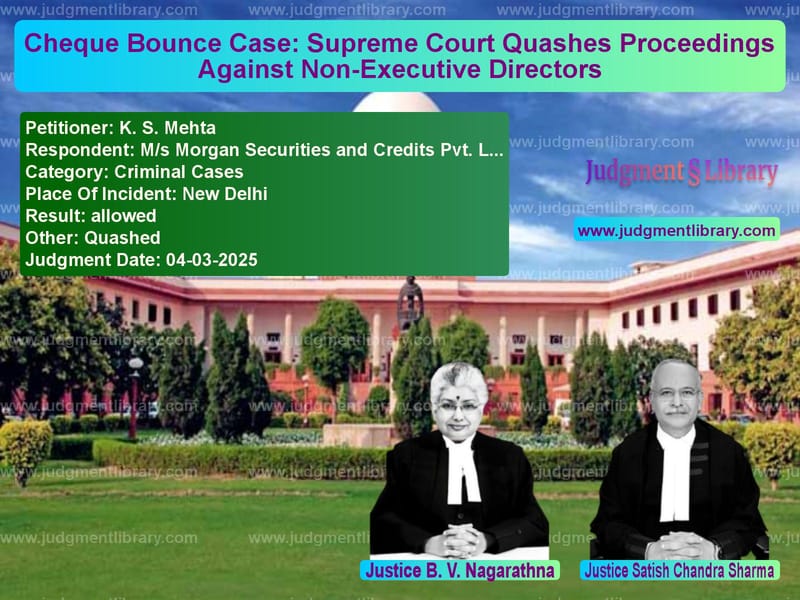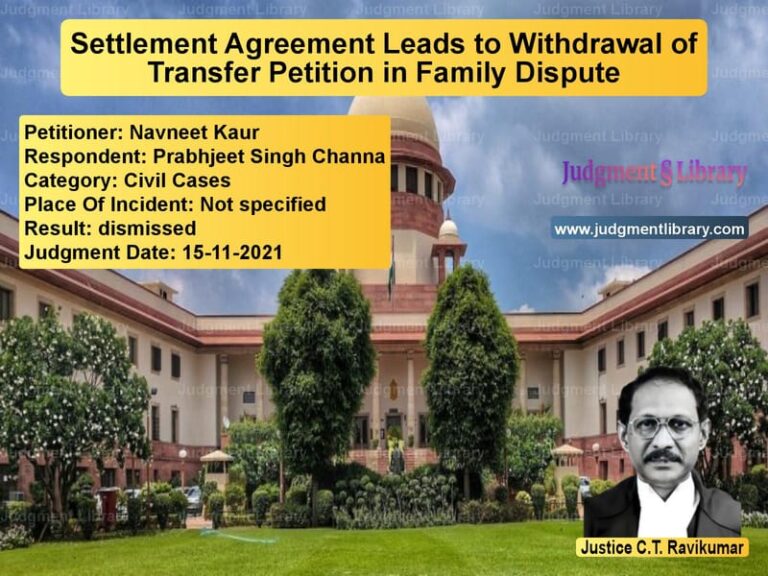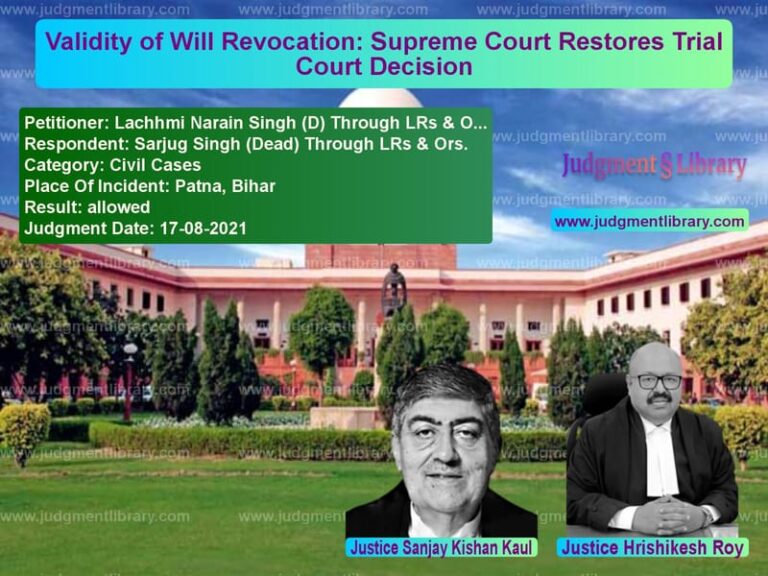Cheque Bounce Case: Supreme Court Quashes Proceedings Against Non-Executive Directors
The Supreme Court of India recently delivered an important judgment in the case of K. S. Mehta v. M/s Morgan Securities and Credits Pvt. Ltd., setting a significant precedent on the liability of non-executive directors in cheque bounce cases under Section 138 and Section 141 of the Negotiable Instruments Act, 1881 (NI Act). The Court ruled that non-executive directors, who are not involved in the company’s financial affairs, cannot be held vicariously liable under the NI Act for dishonored cheques issued by the company.
Background of the Case
The case originated from an inter-corporate deposit (ICD) agreement executed on September 9, 2002, between the accused company, M/s Blue Coast Hotels & Resorts Ltd., and the respondent, M/s Morgan Securities and Credits Pvt. Ltd.. Under the agreement, the respondent provided a financial facility of ₹5 crore against securities for a period of 180 days.
The company subsequently issued two post-dated cheques:
- Cheque No. 842628 dated February 28, 2005, for ₹50,00,000.
- Cheque No. 842629 dated March 30, 2005, for ₹50,00,000.
Upon presentation, both cheques were dishonored due to insufficient funds. The respondent issued legal notices demanding payment, but the company failed to take any remedial action, leading to the initiation of criminal proceedings against all directors, including the appellants.
Petitioner’s Arguments
The petitioners, K. S. Mehta and Basant Kumar Goswami, were former non-executive directors of the company. They argued that:
- They had no role in the company’s financial affairs and were not involved in the issuance of the dishonored cheques.
- They were non-executive directors designated under Clause 49 of SEBI’s Listing Agreement, meaning they had oversight responsibilities but no operational or financial decision-making powers.
- They did not attend the board meeting on September 9, 2002, where the ICD agreement was approved.
- They neither signed the cheques nor authorized their issuance.
- They had resigned from the company before the dishonored cheques were issued (Mehta in 2012 and Goswami in 2014).
The petitioners relied on key precedents, including:
- S.M.S. Pharmaceuticals Ltd. v. Neeta Bhalla & Anr. (2005) 8 SCC 89 – Mere designation as a director does not create vicarious liability under Section 141 of the NI Act.
- National Small Industries Corp. Ltd. v. Harmeet Singh Paintal (2010) 3 SCC 330 – There must be specific allegations against directors showing their direct involvement in financial affairs.
- Pooja Ravinder Devidasani v. State of Maharashtra (2014) 16 SCC 1 – Non-executive directors cannot be held liable unless they are actively involved in the company’s business.
Respondent’s Arguments
The respondent, M/s Morgan Securities and Credits Pvt. Ltd., argued that:
- The petitioners were directors at the time of the transaction and, therefore, presumed to be involved in the company’s financial affairs.
- The onus was on the petitioners to prove their lack of involvement.
- Merely resigning from the company does not automatically absolve a director from liability under Section 141 of the NI Act.
- The petitioners attended board meetings, which indicated knowledge of the company’s financial transactions.
The respondent cited Ashutosh Ashok Parasrampuriya v. Gharrkul Industries Pvt. Ltd. (2023) 14 SCC 770, arguing that the issue of the petitioners’ involvement should be determined during the trial, not at the quashing stage.
Supreme Court’s Analysis
The Supreme Court examined the principles of vicarious liability under Section 141 of the NI Act and emphasized that non-executive directors cannot be held liable unless there is clear evidence of their involvement in the company’s financial transactions.
Key Judicial Findings
- No Specific Allegations: The complaint lacked specific allegations showing that the petitioners were responsible for the issuance or dishonor of the cheques.
- No Role in Financial Transactions: The petitioners were non-executive directors and did not participate in financial decision-making.
- Absence from Board Meeting: The petitioners were not present at the board meeting where the ICD agreement was approved.
- Legal Precedents: The Court reaffirmed its stance from previous rulings that vicarious liability cannot be imposed solely based on a director’s position in the company.
Key Observations from the Judgment
“Section 141 is a penal provision creating vicarious liability, and which, as per settled law, must be strictly construed. It is not sufficient to make a bald cursory statement in a complaint that the director is in charge of and responsible for the conduct of the business of the company without anything more.”
“For fastening criminal liability, there is no presumption that every director knows about the transaction. There must be specific allegations demonstrating active participation.”
Final Judgment
Based on these findings, the Supreme Court ruled:
“The criminal proceedings against the petitioners in Complaint Nos. 15858 and 15857 of 2017 pending before the Court of Additional Chief Metropolitan Magistrate, New Delhi, are hereby quashed.”
The appeals were allowed, and no costs were imposed.
Implications of the Judgment
- Clarification on Director Liability: Non-executive directors cannot be held liable under Section 138 of the NI Act unless they actively participate in the company’s financial affairs.
- Protection for Independent Directors: The ruling reinforces protections for independent and non-executive directors from unwarranted criminal prosecution.
- Higher Burden on Complainants: Complainants must provide specific allegations linking directors to financial transactions to establish vicarious liability.
- Strengthening Corporate Governance: The judgment upholds corporate governance principles by distinguishing oversight roles from executive responsibilities.
Conclusion
The Supreme Court’s ruling in this case is a landmark decision for corporate law and the liability of directors under the NI Act. It ensures that non-executive directors are not unfairly prosecuted for cheque dishonor cases without clear evidence of their involvement in financial transactions. This judgment serves as a crucial precedent, reinforcing the necessity of specific allegations before initiating criminal proceedings against directors in such matters.
Petitioner Name: K. S. Mehta.Respondent Name: M/s Morgan Securities and Credits Pvt. Ltd..Judgment By: Justice B. V. Nagarathna, Justice Satish Chandra Sharma.Place Of Incident: New Delhi.Judgment Date: 04-03-2025.
Don’t miss out on the full details! Download the complete judgment in PDF format below and gain valuable insights instantly!
Download Judgment: k.-s.-mehta-vs-ms-morgan-securitie-supreme-court-of-india-judgment-dated-04-03-2025.pdf
Directly Download Judgment: Directly download this Judgment
See all petitions in Fraud and Forgery
See all petitions in Bail and Anticipatory Bail
See all petitions in Judgment by B.V. Nagarathna
See all petitions in Judgment by Satish Chandra Sharma
See all petitions in allowed
See all petitions in Quashed
See all petitions in supreme court of India judgments March 2025
See all petitions in 2025 judgments
See all posts in Criminal Cases Category
See all allowed petitions in Criminal Cases Category
See all Dismissed petitions in Criminal Cases Category
See all partially allowed petitions in Criminal Cases Category







